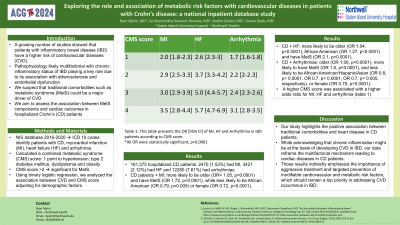Tuesday Poster Session
Category: IBD
P4364 - Exploring the Role and Association of Metabolic Risk Factors With Cardiovascular Diseases in Patients With Crohn’s Disease: A National Inpatient Database Study
Tuesday, October 29, 2024
10:30 AM - 4:00 PM ET
Location: Exhibit Hall E

Has Audio

Ryan Njeim, MD
Staten Island University Hospital, Northwell Health
Staten Island, NY
Presenting Author(s)
Award: Presidential Poster Award
Ryan Njeim, MD1, Nadim Zaidan, MD1, Sai Shanmukha Sreeram Pannala, MD1, Peter Khouri, MD2, Liliane Deeb, MD1
1Staten Island University Hospital, Northwell Health, Staten Island, NY; 2SUNY Downstate Health Sciences University, Staten Island, NY
Introduction: A growing number of studies showed that patients with inflammatory bowel disease (IBD) have a higher risk of cardiovascular diseases (CVD). The underlying pathophysiology is likely multifactorial and although the chronic inflammatory status of IBD might play a key role in this elevated risk due to its association with atherosclerosis and endothelial dysfunction, we suspect that the presence of traditional comorbidities such as metabolic syndrome (MetS) could be a major driver of CVD in this setting. We aim to assess the association between MetS components and cardiac outcomes in hospitalized Crohn’s (CD) patients.
Methods: Using the NIS database 2016-2020, we used ICD 10 codes to identify patients with CD, myocardial infarction (MI), heart failure (HF) and arrhythmia. Additionally, we assigned 1 point to the following comorbidities: hypertension, type 2 diabetes mellitus, dyslipidemia and obesity and then calculated a combined metabolic syndrome (CMS) score, considering a score >2 to be significant for MetS. Using binary logistic regression, we analyzed the association between CVD and CMS score adjusting for demographic factors.
Results: Of the 161,375 hospitalized CD patients, 2470 (1.53%) had MI, 3421 (2.12%) had HF and 12280 (7.61%) had arrhythmias. CD patients who had MI were more likely to be older (OR= 1.05, p< 0.0001) and have MetS (OR 1.72, p< 0.0001), while less likely to be African American (OR 0.79, p=0.005) or female (OR 0.72, p< 0.0001). Regarding HF, the patients were more likely to be older (OR 1.04, p< 0.0001), African American (OR 1.27, p< 0.0001) and have MetS (OR 2.1, p< 0.0001). Concerning arrhythmias, patients were older (OR 1.06, p< 0.0001), more likely to have MetS (OR 1.6, p< 0.0001), and less likely to be African American/Hispanic/Asian (OR 0.8, p< 0.0001, OR 0.7, p< 0.0001, OR 0.7, p= 0.005, respectively), or female (OR 0.75, p< 0.0001). A higher CMS score was associated with a higher odds ratio for MI, HF and arrhythmia (Table).
Discussion: Our study highlights the positive association between traditional comorbidities and heart disease in CD patients. While acknowledging that chronic inflammation might be at the basis of developing CVD in IBD, our data reframe the multifactorial mechanism leading to cardiac diseases in CD patients. Those results indirectly emphasize the importance of aggressive treatment and targeted prevention of modifiable cardiovascular and metabolic risk factors, which should remain a top priority in addressing CVD occurrence in IBD.
Note: The table for this abstract can be viewed in the ePoster Gallery section of the ACG 2024 ePoster Site or in The American Journal of Gastroenterology's abstract supplement issue, both of which will be available starting October 27, 2024.
Disclosures:
Ryan Njeim, MD1, Nadim Zaidan, MD1, Sai Shanmukha Sreeram Pannala, MD1, Peter Khouri, MD2, Liliane Deeb, MD1. P4364 - Exploring the Role and Association of Metabolic Risk Factors With Cardiovascular Diseases in Patients With Crohn’s Disease: A National Inpatient Database Study, ACG 2024 Annual Scientific Meeting Abstracts. Philadelphia, PA: American College of Gastroenterology.
Ryan Njeim, MD1, Nadim Zaidan, MD1, Sai Shanmukha Sreeram Pannala, MD1, Peter Khouri, MD2, Liliane Deeb, MD1
1Staten Island University Hospital, Northwell Health, Staten Island, NY; 2SUNY Downstate Health Sciences University, Staten Island, NY
Introduction: A growing number of studies showed that patients with inflammatory bowel disease (IBD) have a higher risk of cardiovascular diseases (CVD). The underlying pathophysiology is likely multifactorial and although the chronic inflammatory status of IBD might play a key role in this elevated risk due to its association with atherosclerosis and endothelial dysfunction, we suspect that the presence of traditional comorbidities such as metabolic syndrome (MetS) could be a major driver of CVD in this setting. We aim to assess the association between MetS components and cardiac outcomes in hospitalized Crohn’s (CD) patients.
Methods: Using the NIS database 2016-2020, we used ICD 10 codes to identify patients with CD, myocardial infarction (MI), heart failure (HF) and arrhythmia. Additionally, we assigned 1 point to the following comorbidities: hypertension, type 2 diabetes mellitus, dyslipidemia and obesity and then calculated a combined metabolic syndrome (CMS) score, considering a score >2 to be significant for MetS. Using binary logistic regression, we analyzed the association between CVD and CMS score adjusting for demographic factors.
Results: Of the 161,375 hospitalized CD patients, 2470 (1.53%) had MI, 3421 (2.12%) had HF and 12280 (7.61%) had arrhythmias. CD patients who had MI were more likely to be older (OR= 1.05, p< 0.0001) and have MetS (OR 1.72, p< 0.0001), while less likely to be African American (OR 0.79, p=0.005) or female (OR 0.72, p< 0.0001). Regarding HF, the patients were more likely to be older (OR 1.04, p< 0.0001), African American (OR 1.27, p< 0.0001) and have MetS (OR 2.1, p< 0.0001). Concerning arrhythmias, patients were older (OR 1.06, p< 0.0001), more likely to have MetS (OR 1.6, p< 0.0001), and less likely to be African American/Hispanic/Asian (OR 0.8, p< 0.0001, OR 0.7, p< 0.0001, OR 0.7, p= 0.005, respectively), or female (OR 0.75, p< 0.0001). A higher CMS score was associated with a higher odds ratio for MI, HF and arrhythmia (Table).
Discussion: Our study highlights the positive association between traditional comorbidities and heart disease in CD patients. While acknowledging that chronic inflammation might be at the basis of developing CVD in IBD, our data reframe the multifactorial mechanism leading to cardiac diseases in CD patients. Those results indirectly emphasize the importance of aggressive treatment and targeted prevention of modifiable cardiovascular and metabolic risk factors, which should remain a top priority in addressing CVD occurrence in IBD.
Note: The table for this abstract can be viewed in the ePoster Gallery section of the ACG 2024 ePoster Site or in The American Journal of Gastroenterology's abstract supplement issue, both of which will be available starting October 27, 2024.
Disclosures:
Ryan Njeim indicated no relevant financial relationships.
Nadim Zaidan indicated no relevant financial relationships.
Sai Shanmukha Sreeram Pannala indicated no relevant financial relationships.
Peter Khouri indicated no relevant financial relationships.
Liliane Deeb indicated no relevant financial relationships.
Ryan Njeim, MD1, Nadim Zaidan, MD1, Sai Shanmukha Sreeram Pannala, MD1, Peter Khouri, MD2, Liliane Deeb, MD1. P4364 - Exploring the Role and Association of Metabolic Risk Factors With Cardiovascular Diseases in Patients With Crohn’s Disease: A National Inpatient Database Study, ACG 2024 Annual Scientific Meeting Abstracts. Philadelphia, PA: American College of Gastroenterology.

